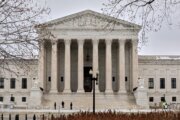This article was republished with permission from WTOP’s news partners at Maryland Matters. Sign up for Maryland Matters’ free email subscription today.
This content was republished with permission from WTOP’s news partners at Maryland Matters. Sign up for Maryland Matters’ free email subscription today.
Nancy Mae Hawker, a retired special education instructional assistant in Carroll Manor Elementary School, kept a diary detailing every verbal and physical abuse she witnessed by the classroom teacher she was working in the same room with for five months.
On April 26, 2017, Hawker wrote that the teacher told one of the special education aides to take a student to a refrigerator in the school building as punishment. The student was afraid of refrigerators. On May 15, when a student threw his iPad on the floor, the teacher yanked the student out of his chair and demanded that he pick up the iPad and cursed at him. On May 18, the teacher put a student in seclusion with the lights turned off and taunted him by saying he could not have cake because he had been a “bad boy.”
“It was absolutely bizarre,” Hawker, who had worked as a special education aide in Frederick County Public Schools for 13 years before retiring in 2019, said in an interview. She said she told the school principal about how the teacher treated the students in April, but did not see any change for the rest of the school year.
“It’s a stressful situation, but they’re still human, and you still have to treat them with love and respect,” Hawker said. “I believe that the way the children were treated would not have occurred had there been cameras in this classroom because they would have known somebody was watching.”
For the third year, Del. Michele Guyton (D-Baltimore County) is introducing legislation that would require each local board of education to install at least one video recorder in every public school classroom that students with disabilities regularly attend by the 2023-2024 school year.
The videos, which would not record sound, would be viewed by the school administration and law enforcement within three days of a complaint of abuse, neglect or harm. And the video recordings could not be used to monitor school employees’ performance or as evidence against a student that is not related to a criminal complaint, according to the bill.
In past years, the measure has not received a vote in committee.
But this iteration of Guyton’s bill comes after federal investigators disclosed that Frederick County Public Schools had improperly restrained or secluded students with disabilities more than 7,250 times over two and a half years. At the end of December, the Maryland Department of Education stated that it is developing an action plan “to provide increased oversight and corrective measures to ensure system reform in FCPS.”
“We often take for granted daily check-ins with our kids,” but parents of children with disabilities cannot, Guyton told the Ways and Means committee on Thursday. “If the child is clearly upset, if that child is literally bruised and broken at the end of the day,” they cannot communicate what had happened to their parents, she continued.
The bill would not only protect children who cannot speak for themselves, but also teachers from false allegations of abuse, Guyton said. She pointed out that the state spends millions of dollars investing in body cameras on police officers to protect vulnerable populations. This bill has the same principle and is less expensive, she said.
The Frederick County Board of Education voted to support Guyton’s bill during a meeting last month. FCPS Interim Superintendent Mike Markoe said that he is considering installing cameras in classrooms with nonverbal students, regardless of the outcome of the state legislation.
During a hearing on the bill this week, parents chronicled experiences trying to figure out what happened to their children after they came home from school bruised. The parents may be able to learn what happened if there is video footage of their child’s day, they said. There was no verbal opposition to Guyton’s bill at the hearing and the Maryland State Education Association did not take a position on the bill.
Tracy Masur, parent of a 6-year-old kindergartner in Harford County Public Schools, said that her child was dragged through the school hallways into a quiet room or segregated classroom more than 40 times by multiple school staff, even though she had never given permission to the school to restrain and seclude her child.
The restraint incidents were only revealed after viewing camera footage in the hallway, she said. But her child also spent a lot of time in a classroom “with only staff and no peers for hours on end.”
“We’ll never know what happened in that room because there were no cameras,” she said tearfully. “My little one has been severely traumatized after only four months of kindergarten … and I’m left to pick up the pieces to try to make this right for my child.”
Susan Reinhart, who has a daughter with cerebral palsy named Destiny, recalled a time when Destiny came home from school with a broken leg. Reinhart concluded that it did not happen in the school hallway or during gym class, where there are cameras, but could not confirm it happened in her classroom. “We were told to move on,” said Reinhart, who still doesn’t know the cause of her daughter’s injury.
On a different occasion, a school employee was fired for physically mishandling Destiny, which was attested by another school employee who recorded the incident. But Reinhart said she only found out about it when the fired employee called Reinhart to tell their side of the story. “You heard me correctly — my nonverbal child was physically assaulted by a school employee, an employee fired, and we were never told,” she said.
Guyton’s bill would require a principal to notify parents within 24 hours if a public school employee reported that their child was subject to abuse or neglect in a special education classroom or exclusion area.
Supporters of the legislation also noted that the bill will help school staff, which has been in flux throughout the pandemic. “We can’t afford a teacher to be removed from classrooms based on erroneous allegations, even for a short period of time,” said ANDE Kolp, executive director of The Arc Maryland, a disability advocacy group.
But the bill does not come without a cost. Installing video cameras in 800 classrooms would cost Anne Arundel County Public Schools over a million dollars in fiscal year 2023 to 2024, according to the bill’s fiscal note. Baltimore City Public Schools would have to spend $2 million for video equipment and staff training and Montgomery County Public Schools estimated a cost of $26.6 million for the same time period.
In 2015, Texas became the first state to enact a law that required schools to put cameras in special education classrooms if a parent or staff member requested it. Two other states — West Virginia and Louisiana — have passed similar bills, and Georgia and Florida have passed laws to run pilot programs.
A disability rights group from Texas weighed in on Guyton’s bill in a written testimony, stating that they have not seen negative effects that they had feared, such as more exclusionary discipline. Instead, the opposite has occurred and the existence of video recordings has allowed them to effectively investigate illegal uses of restraint, they wrote.
Del. Mike Griffith (R-Cecil and Harford), who has a seven-year old nonverbal autistic child in Harford County Public Schools, thanked Guyton for sponsoring this bill. Wondering if nonverbal children are being abused and not able to express themselves “keeps all of us up at night,” he said.
Sens. Craig Zucker (D-Montgomery), Katie Fry Hester (D-Carroll) and Michael Hough (R-Frederick) are also taking up a separate bill that would preclude public schools from physically restraining or secluding students except under certain conditions and require the Maryland Department of Education to develop an accountability system.
This comes after Hough implored MSDE to launch an independent investigation into Frederick County Public Schools after the federal investigation.
Hawker, the special education instructional assistant who had kept a diary, noted that most of the abuse she witnessed was verbal. And although Guyton’s bill will require public schools to install video cameras to record without sound, Hawker said she believes that teachers would behave differently if there was a camera watching them.
“This is the beginning,” she said. “Getting [cameras] in the classroom — that’s the most important thing, and then later on, maybe audio can be added.”







